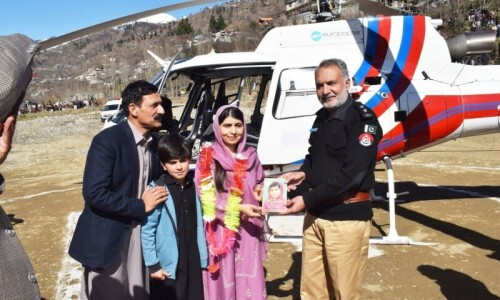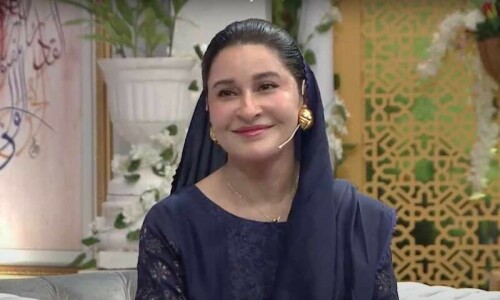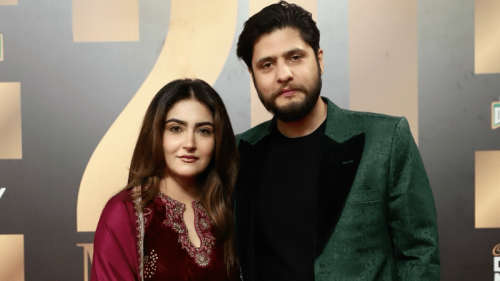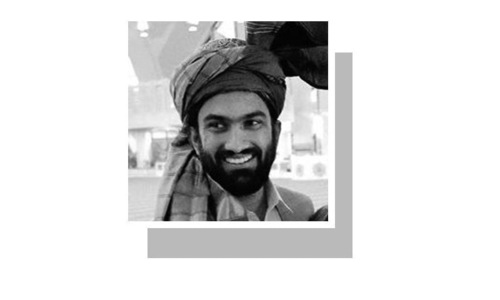
“I have lots of willpower and a loving family to support me. I have lived a wonderful life so I am always ready for anything that God ordains for me.” So said Fatima Surraiya Bajiya in an interview to Dawn more than two years ago. Shortly afterwards, Bajiya suffered a stroke which restricted her movements. She continued her battle with her health for nearly two years before departing peacefully for the next abode. She was an icon. An upholder of family values, a woman dedicated to her work and to helping people in need.
Bajia was born in Karnataka, Hyderabad Deccan in September 1930. She was tutored at home and being an avid reader developed an extensive knowledge of Arabic, Persian, English and Urdu history and literature. An extraordinary and extremely talented person she brought up her siblings including poet Zehra Nigah, designer Mrs Kazmi, Anwar Maqsood and Zubaida Tariq, their father having died at a young age.
She wrote extensively for PTV making her debut in 1966. She wrote drama serials such as Aroosa, Zeenat, Shama, Afshan, Ana and Agahi that were very popular with the viewers. Recipient of the Pride of Performance award and Hilal-i-Imtiaz from the government of Pakistan, she was also awarded the highest Japanese civilian award in recognition of her services for the promotion of Japanese culture and literature in Pakistan. She was also an adviser to the Governor of Sindh for many years. A staunch reformer who enriched the world of art and literature with her enormous contribution and presence, Bajiya has left a vacuum in the world of showbiz after her death.
Those from the entertainment industry that knew her well, spoke of their loss:
A staunch reformer who enriched the world of art and literature with her enormous contribution and presence, Bajiya has left a vacuum in the world of showbiz after her death
Zaheer Khan
“I met Bajiya for the first time in Chaklala at the training centre for PTV in 1966. The Secretary of Information, Altaf Gohar, had invited Bajiya to work there. She wrote a series named Auraq and did the set designs herself and worked very hard. Rana Sheikh, the former MD of PTV, did cultural programmes then and Bajiya would do the sets for those as well, carrying a pandaan in her hand and gao takkiyas in the other or hand fans, whenever the need arose, to make the sets look authentic.
“When I came to Karachi after the training, Bajiya was working there too. She wrote the serial Afshan, an adaptation of A.R. Khatoon’s novel, which I directed. From the first episode she emphasized on culture in such a way it became very popular with the viewers. She brought out the values of a joint family system, how to talk to elders, how to behave. I learnt so much from her like all the others who came in contact with her. She was like a mother for PTV as she brought people together from all the centers for her serial.
“Very few writers who get involved in their plays, Bajiya was one of them. She would bring things from her home just to make the sets look better. Brilliant artists such as Begum Khursheed Mirza, Arshe Muneer, Ayesha Khan, Qazi Wajid, Shakeel, Azra Sherwani etc. acted in Afshan.
Bajiya had great aesthetic sense. She was also a perfectionist and brought in new faces. She would never refuse anyone who wanted help from her. Bajiya’s death has created a vacuum in television. PTV was at its height with brilliant people working then such as Majnoon Gorakhpuri, Faiz Ahmed Faiz, Jamiluddin Aali — all institutions in themselves.”
Haseena moin
“Bajiya was a woman who dedicated her life for others. Being the eldest she took care of her brothers and sisters, their education and well being, taking the place of their father who had died while they were young. She was educated at home and read books to increase her general knowledge and because she was talented she did everything well, such as writing serials for stage and TV, presenting songs of Amir Khusro and doing milads. Adaptation of novels into drama serials of writer A.R. Khatoon became extremely popular with the viewers. She was respected by everyone because of her loving attitude. She lived with her mother and maternal grandmother, taking care of them as well. She was an independent, successful woman doing so many things at the same time. She loved plants, doing embroidery and interior designing. She would never refuse anyone when she was invite by them to attend functions. Bajiya was a fighter and fought her illness bravely.”
Zubaida Tariq
“Bajiya was like a mother, and our mother always encouraged her to take our decisions as she was the eldest. She was with my mother from the age of 19 after her marriage at the age of 16, and looked after us like her children. She sacrificed herself for her siblings and took care of us by spending the money she earned on us. She would participate wholeheartedly in weddings and other family functions. My nana and mother emphasized on culture and values which were continued by Bajiya and we knew about literature and arts.
“We learnt a lot in our joint family system, my great grandmother, grandmother and my mother and sister looked after us and made us feel special but also disciplined us, and today because of our wonderful environment we have all done well in our respective careers. We have seen hard times as our father had died young but they were the most wonderful years as there was love and caring all around us. My sister Zehra Nigah’s verse fits Bajiya perfectly:
Shakista nazron ki dhun mein jab bhi bikher gaye tau hum nay dekha,
Na koi andaz-e-rehguzar tha na koi nakshe-pa tha,
Tamam logon say rakh rakhao teri chahat ka tha saliqa,
Tamam duniya say dosti bhi teri mohabat ka wasta tha.”
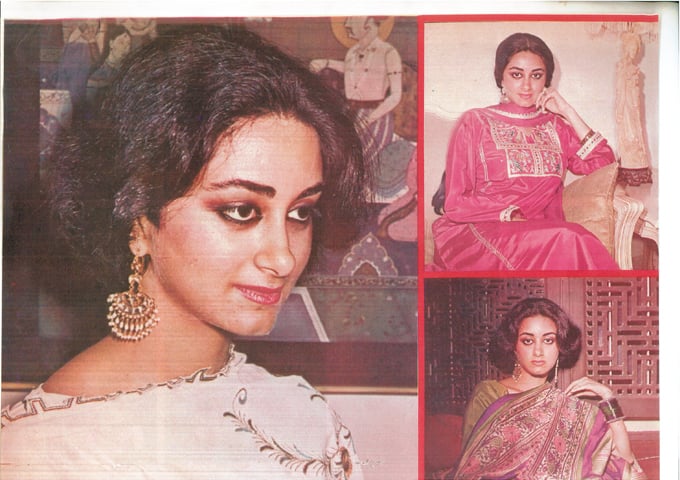
Shakeel
“I have worked the longest with Bajiya compared to other artists, my association spanning 40 years. Two weeks after my mother passed away, I was doing Parchaiyan and saw Bajiya writing in the room at PTV with her feet on a chair, which resembled my mothers. I became emotional and Bajiya hugged me and said ‘From today I am your mother’. People like Bajiya don’t exist anymore.
“I owe a lot to Bajiya in my profession along with Haseena Moin. I played the main role in Afshan, Agahi, Ana, Asawi, Abgeenay, Uroosa, Sassi Pannu and many others. I did three plays for Bajiya on stage; the best was Zabaan-e-Yare-Mann, an adaptation of Pygmalion, and two Japanese plays.
“I was with Bajiya when she was going to hospital for her operation. She was a fighter and a very strong person and overcame her disease. She took problems in her stride, never letting them overpower her. In the 20 months of her illness before her death she only had her past memories mostly, and she would often ask her family ‘Where is my hero Shakeel’. I visited her regularly during this time. I hadn’t totally recovered from her death, and soon after I lost my brother, which has reinforced the pain of losing two very close people in my life.
“What has hurt me tremendously is that very few people from showbiz turned up for this iconic woman’s namaz-e-janaza. The younger generation is lost in their world, unaware of the values of life.”
Sultana Siddiqi
“I have worked with Bajiya a lot of times in the past and produced milaad programmes with her for PTV which she had introduced. She would make beautiful things and bring them to the studio to make the sets look nice, such as embroidered gota covers and flowers etc. She did everything with dedication.
“Our association became stronger with time because she was so loving and caring. She liked to help people all the time without realising the effect it had on her health. She promised to write a serial for me, which unfortunately could not be fulfilled. She chose pretty and educated girls for her serials setting a trend. She also did the sets for a series based on Amir Khusro’s songs which had beautiful settings. Today there is nobody to take her place, a void, which is difficult to fill.”
Behroze Sabswari
“I have known Bajiya for a long time. I can proudly say that I am a part of her family. She taught me how to sit, to behave and how to pronounce Urdu words properly. I thank her from the bottom of my heart for grooming me and paying so much attention. The greatest thing about Bajiya was that she never differentiated amongst people and would hug anyone belonging to any tier of society with the same love, rich or poor. This is what she was all about, a woman of substance, who was loving, bright, extremely talented and cultured. It is for these reasons that the pain of her loss is still continuing in the hearts of people who knew her.
“I acted in many of her plays. Aabgeena was an historical serial which was in colour, for the first time. Brahim ki Talaash directed by Qasim Jalali and written by Bajiya, was a play that impacted me the most. Though I was very close to Bajiya, I deeply regret that I could not do anything for her.”
Mehreen Ilahi
“Bajiya saw me for the first time at her sister’s, Mrs Kazmi’s boutique, and asked me to do the lead for a serial she was writing. My mother who was standing there disapproved of my acting as I was studying abroad then. Ultimately, she did agree at Bajiya’s insistence promising to take care of me on the sets, and so I became the lead in Ana. Then I went back to my studies in America getting credits in advance for the semester I had missed.
“Bajiya started my acting career as I did other serials after returning from the States. She was a perfectionist and would rewrite the dialogues on the set making us go over them again. Bajiya would never get tired even at four in the morning, while we would be falling down with fatigue. She was extremely loving with everyone on the sets, bringing food and helping people when they needed it. She groomed everyone on the sets. She was so involved in everything, making the mehndi scene so beautiful in Ana. She would stress on how to do the make up, how the lighting was to be done, what clothes were to be worn, doing half the work of all the departments involved. We will miss her sorely.”
Shahzad Roy
“I knew Bajia for several years. Every time I met her she would be generous with her praise and prayers for me. She was a lovable person. Dignity embodied and a role model for many. Her plays were watched with great enthusiasm by my family and friends. Every time we met we reaffirmed to work together and that she will write some play for me. Alas regretfully this never happened.”
Published in Dawn, Sunday Magazine, February 21st, 2016




















